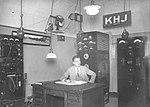Keystone Studios

Keystone Studios was an early film studio founded in Edendale, California (which is now a part of Echo Park) on July 4, 1912 as the Keystone Pictures Studio by Mack Sennett with backing from actor-writer Adam Kessel (1866–1946) and Charles O. Baumann (1874–1931), owners of the New York Motion Picture Company (founded 1909). The company, referred to at its office as The Keystone Film Company, filmed in and around Glendale and Silver Lake, Los Angeles for several years, and its films were distributed by the Mutual Film Corporation between 1912 and 1915. The Keystone film brand declined rapidly after Sennett went independent in 1917.The name Keystone was taken from the side of one of the cars of a passing Pennsylvania Railroad train (Keystone State being the nickname of the Commonwealth of Pennsylvania) during the initial meeting of Sennett, Kessel and Baumann in New York.The original main building, the first totally enclosed film stage and studio in history, is still standing. It is located at 1712 Glendale Blvd in Echo Park, Los Angeles and is now being used as a storage facility.
Excerpt from the Wikipedia article Keystone Studios (License: CC BY-SA 3.0, Authors, Images).Keystone Studios
Glendale Boulevard, Los Angeles Echo Park
Geographical coordinates (GPS) Address Nearby Places Show on map
Geographical coordinates (GPS)
| Latitude | Longitude |
|---|---|
| N 34.086213888889 ° | E -118.25966666667 ° |
Address
Glendale Boulevard 1656
90026 Los Angeles, Echo Park
California, United States
Open on Google Maps




